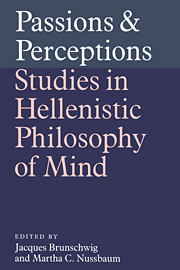Book contents
- Frontmatter
- Contents
- Preface
- Avant-propos
- Part I ETHICS AND PSYCHOLOGY OF HEDONISM
- Part II ATOMISM AND EPICUREAN PSYCHOLOGY
- Part III THE PASSIONS
- Chapter 5 Poetry and the passions: two Stoic views
- Chapter 6 Seneca and psychological dualism
- Chapter 7 Actions and passions: affection, emotion, and moral self-management in Galen's philosophical psychology
- Part IV STOIC PSYCHOLOGICAL CONCEPTS
- Bibliography
- Subject index
- Name index
- Index of passages cited
Chapter 6 - Seneca and psychological dualism
Published online by Cambridge University Press: 22 September 2009
- Frontmatter
- Contents
- Preface
- Avant-propos
- Part I ETHICS AND PSYCHOLOGY OF HEDONISM
- Part II ATOMISM AND EPICUREAN PSYCHOLOGY
- Part III THE PASSIONS
- Chapter 5 Poetry and the passions: two Stoic views
- Chapter 6 Seneca and psychological dualism
- Chapter 7 Actions and passions: affection, emotion, and moral self-management in Galen's philosophical psychology
- Part IV STOIC PSYCHOLOGICAL CONCEPTS
- Bibliography
- Subject index
- Name index
- Index of passages cited
Summary
SENECA AND ORTHODOXY
Seneca's ‘philosophy of mind’ presents us with many puzzles, but in this it is no more than a faithful mirror of his philosophy as a whole. In this paper I am interested in how his views on the structure and operations of the human soul relate to those of so-called orthodox Stoics, and how one goes about assessing such an issue. That Seneca is not a slavish or unimaginative representative of Chrysippean Stoicism seems clear from the most casual reading of his work and the most cursory glance through the abundant secondary literature. But it is not clear just how his views on the soul differ from those of the early Stoics.
Seneca is sometimes described by the (traditionally pejorative) term ‘eclectic’. But as Pierluigi Donini and others have shown, we can no longer take for granted the usefulness of that simple description in the study of later ancient philosophy; indeed, it is not clear that we can readily agree about its meaning. I want at least to set aside the negative associations of the word: even if Seneca is in some sense an ‘eclectic’ it should not be assumed that he is for that reason a derivative, less powerful or less interesting thinker. Further, I want to argue that in one important area of the philosophy of mind, the theory of the passions, we should not be calling Seneca an eclectic at all. His approach is open, but not eclectic.
- Type
- Chapter
- Information
- Passions and PerceptionsStudies in Hellenistic Philosophy of Mind, pp. 150 - 183Publisher: Cambridge University PressPrint publication year: 1993
- 1
- Cited by



